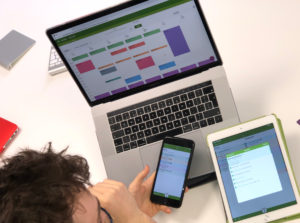Brain in Hand: technology that’s supporting people with mental health difficulties
Posted: 11th June 2020
 We are profiling some of the innovators we’ve been working with who have developed tried and tested solutions to support healthcare providers in our region with their response to COVID-19.
We are profiling some of the innovators we’ve been working with who have developed tried and tested solutions to support healthcare providers in our region with their response to COVID-19.
In our first two posts, we focused on DrDoctor and Patients Know Best, in this article we are focusing on Brain in Hand (BiH) – a scalable, market-ready digital tool suitable for the self-management of anxiety-based mental health difficulties.
Thinking differently about how mental health support can be delivered is a priority. COVID-19 has forced rapid change not only on the methods and modes available for services to provide support, but also on the perspectives of those who receive it.
The pandemic has demanded change in working practices, in the way we learn, shop, engage with others, and even engage with healthcare. Now that everything has to be done online, there is no reason why it shouldn’t be as simple to run a business, to see our doctors, or to receive mental health support as it is to stream a movie.
After many years of trying to argue the case for using technology to deliver empowering, personalised, self-management, Brain in Hand believes that the paradigm shift created by the COVID-19 pandemic will be the time for digital technologies to take their proper place in the continuum of care for people with anxiety-based mental health difficulties. The adoption of technology within services has lagged chronically behind their adoption in the wider population. Now is the time for services to catch up.
The system combines technology (web-based software) and personalised assistance (personal planning and access to non-medical help) to provide round-the-clock support to help people live well independently.
Approved by government departments and in use in social care and higher education settings across the UK, Brain in Hand has significant potential as a tool for the NHS. It is being trialled in NHS settings and early results from an NHS England funded project suggest that BiH can be deployed safely in a care pathway. Over 20% of English local authorities (45% in London) integrate Brain in Hand into support pathways, and over 80% of UK universities have Brain in Hand users funded by the Department for Education. We are in receipt of NHS funding under the SBRI Healthcare programme to integrate our system into health and care pathways (autism) to ease workforce pressures and have a flagship programme funded by NHS England to deliver Brain in Hand into Learning Disabilities primary care support pathways.
BiH meets Tier 2 of the NICE Framework for Digital Health Technologies and they have numerous case studies of impact not only for the end user, e.g. in terms of increased confidence and better management of anxiety, but also in savings for services, e.g. reduced use of support services. Here we showcase two user and organisational stories of impact.
Sam, from Kirklees in Yorkshire, lives with an anxiety related mental health condition that took a turn for the worse. She was unable to work and was referred to a community mental health support unit. Here, she talks about her experience of using Brain in Hand alongside the commissioner’s views on how the support system is saving them costs.
Brain in Hand users and the specialists who onboard them have been overwhelmingly positive about how the digital tool is being delivered remotely. Using video conferencing instead of meeting in-person has been an easy transition for users and there have been very few incidents where bandwidth or hardware have seriously affected the quality of the onboarding session.
Here, Tom, a Brain in Hand user from Knowsley talks to a Brain in Hand specialist about his experience of using the digital tool during the COVID- 19 pandemic.
The following quotes from users bring to life some of their experiences:
“The sessions have worked well around COVID-19 to take that stress and anxiety away. I don’t really want to be going on to shops at the moment because it will make it harder for my anxiety. So I rely on online shopping, but I’ve put things into my BiH app that if something happens there’s solutions.”
“I enjoyed the sessions and they made me feel more confident, the specialist made me feel that any anxieties were not silly and made me think of different techniques to help my day to day life.”
This Film adds an additional perspective as service- user Tom speaks to BIH specialist, Michelle Martin, about his experience of remote on-boarding.
Our work with Brain In Hand
The Yorkshire & Humber AHSN has assisted Brain in Hand with raising awareness across the region, providing the company with a platform at events that connect innovative solutions with mental health commissioners and practitioners.
Heather Cook from Brain in Hand said: ‘’The Yorkshire & Humber AHSN have provided much needed signposting and commercial support to Brain in Hand as we continue to embed our innovation into health and care pathways. Our SBRI funded programme falls within the AHSN territory as we seek to scale-up adoption and explore the new integrated commissioning processes. I very much look forward to collaborating with the AHSN and the wider AHSN Network as scale-up and adoption of our innovation accelerates.“
Sophie Bates, Programme Manager at Yorkshire & Humber AHSN said: “Brain in Hand’s app has great potential for supporting people with mental health issues. Within our region, the app has been successfully implemented in Kirklees, and we continue to work with the company to scope further opportunities where their technology responds to local needs.’’
